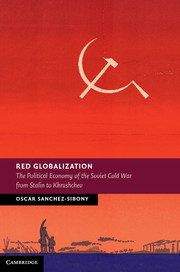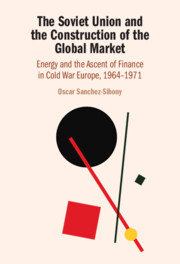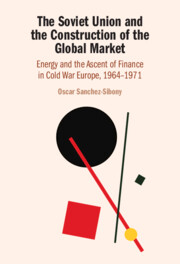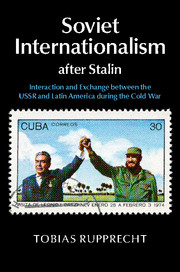Red Globalization
Was the Soviet Union a superpower? Red Globalization is a significant rereading of the Cold War as an economic struggle shaped by the global economy. Oscar Sanchez-Sibony challenges the idea that the Soviet Union represented a parallel socio-economic construct to the liberal world economy. Instead he shows that the USSR, a middle-income country more often than not at the mercy of global economic forces, tracked the same path as other countries in the world, moving from 1930s autarky to the globalizing processes of the postwar period. In examining the constraints and opportunities afforded the Soviets in their engagement of the capitalist world, he questions the very foundations of the Cold War narrative as a contest between superpowers in a bipolar world. Far from an economic force in the world, the Soviets managed only to become dependent providers of energy to the rich world, and second-best partners to the global South.
- The first archive-based analysis of Soviet economic relations, based on previously unstudied Moscow archives
- Offers a controversial new take on the Cold War, questioning the traditional narrative of a contest between superpowers in a bipolar world
- Will give readers a better understanding of Russia today, and the origins of its place in the world
Awards
Winner, 2015 Marshall D. Shuman Book Prize, Association for Slavic, East European, and Eurasian Studies
Reviews & endorsements
"Red Globalization is an interesting and high-quality scholarly work drawing on Soviet history, Cold War studies, and international political economics. It invites ties to several other disciplines, including Soviet economic history, which has not been the focus of recent international scholarship."
Sari Autio-Sarasmo, Slavic Review
Product details
April 2014Hardback
9781107040250
294 pages
229 × 152 × 17 mm
0.56kg
17 b/w illus.
Available
Table of Contents
- Part I. Isolation:
- 1. Depression Stalinism
- 2. Postwar: the Bretton Woods Cold War
- Part II. Aspiration:
- 3. Restoration: resuming the relationship with capitalism
- 4. Maelstrom: the decolonization vortex
- Part III. Integration:
- 5. Conformity and profit: the Soviet economy under American hegemony
- 6. Poor relations: the limits of Soviet economic dysfunction
- Conclusion: Mikoyan's legacy.







